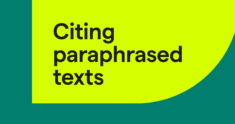
As a current student, it’s almost guaranteed you use social media in some way. It’s also quite likely you’ll write a social media essay at some point in your academic career. If you’re wondering how to write a social media essay, read on—this guide will walk you through just about everything you need to know to write an impactful social media essay.
What is a social media essay?
A social media essay is an essay that discusses social media, its uses, its impacts, and/or users’ experiences. Social media essays can fit into just about any type of writing, and they may be researched academic pieces or thoughtful personal essays.
In today’s world, social media is ubiquitous. Think about the role social media plays in your life—maybe it’s where you connect with friends, how you found your job, where you showcase your hobbies and skills, or how you keep in touch with extended family. Social media, for better or for worse, has changed our social, economic, cultural, and political landscapes.
This is exactly why social media essays are relevant. Unlike an essay about a novel or poem that’s hundreds of years old, writing a social media essay is a way to contribute to the current zeitgeist. You’re adding to the growing body of social media scholarship, potentially creating a primary source that future students and scholars will study to learn about social media from this particular period.
Social media essay topics
Social media essay topics can include anything involving social media. Here are a few examples of strong social media essay topics:
- Social media and society
- Analyzing social media impact
- Comparing social media platforms
- Digital communication analysis
- Social media marketing case studies
- Social media’s influence on youth
When you’re planning a social media essay, it can be helpful to brainstorm broad topics, then narrow them down to find a strong thesis statement and engaging title. If you’re writing a social media essay for an assignment, plan its topic in accordance with the assignment—your instructor might ask you to write a compare-and-contrast or argumentative essay, for example.
Another way to determine a strong topic for your essay is to read existing social media essays. Other essays can inspire you by introducing a subject you’d like to explore further or by showing you where a gap in published work exists, giving you an opportunity to fill that gap.
Social media research
With a clear topic, the next step in writing a social media essay is conducting research. Social media platforms can be credible sources in this subject area—after all, if you’re writing about Instagram engagement, you need to cite relevant content.
Good social media research techniques are the same as good research techniques for any other kind of essay. Choose sources that are credible, such as those published in academic journals. It is also important to consult a variety of sources, including those that don’t support, and may even contradict, your thesis statement. This is how you develop an objective view of your essay’s subject and effectively support your position.
One thing that can make researching for a social media essay challenging is a lack of academic sources. The first social media platform, SixDegrees, launched in 1997. However, social media really didn’t become widespread until roughly 20 years ago, once Myspace and Friendster came on the scene. Even then, platforms that are still operational today, such as Facebook, came later. So, while social media has been in existence for more than 25 years, it’s only been a widespread thing and subject of academic discourse for the past couple of decades. That means the body of scholarship regarding social media is much smaller than the body of scholarship for other subjects, which can make it more challenging for you to find appropriate sources to research and cite.
The upside to this is that the bulk of academic sources about social media are relatively recent, so you’re less likely to encounter theories that have been debunked or significantly outdated statistics. That said, a good general guideline to follow for every essay is to use the most up-to-date sources available.
Essay structure
Structurally, a social media essay is no different from any other essay. It starts with an outline. From this outline, the essay starts with an introduction, which states its thesis. Then, the essay supports its thesis with relevant sources in body paragraphs. It finishes with a conclusion section, often just one paragraph, that summarizes the essay’s topic and revisits the thesis statement.
Because social media is so pervasive, social media essays can fit any essay type. For example, you might write an analytical essay discussing two or more pieces of discourse regarding social media use, or you might write a personal essay discussing how your relationship with social media has evolved over the past decade.
Unless your instructor requires your essay to have a certain word count or fit a certain structure, you usually have some room to play with both of these. A coherent flow of ideas, as well as data from credible sources that support your thesis statement, is a far bigger part of writing a strong essay than hitting a certain number of words. Clear flow makes your essay easy to read and understand, which makes your thesis statement impactful.
Analyze social media impact
Analyzing social media impact is a topic you can discuss in numerous directions. However, it can also be challenging because finding unbiased sources on social media is not always easy. This is especially true when you’re writing about topics like personal relationships, education, and politics.
Critical social media studies, like case studies and comparative analyses, are the right sources to consult when analyzing social media impact—not your friends’ profiles.
Incorporate statistics and data
Relevant statistics and data are important in any academic essay. In a social media essay, statistics and data are often used to demonstrate the scope of the topic being discussed. For example, in an essay about the growth of TikTok during the COVID-19 pandemic, account creation statistics support your claim. Similarly, data from reputable sources, like academic digital communication analysis, underscores your position’s academic merit.
Balance personal insight and academic rigor
Your essay might call for personal insights, or it might not. Whether personal insights are relevant to your essay depends on the type of essay you’re writing.
If you’re writing an analytical, expository, or argumentative essay, don’t include personal anecdotes. The purpose of these kinds of essays is to examine sources objectively and reach logical positions and understanding.
In contrast, if you’re writing a personal essay, a synthesis essay, or in some cases, a political essay or a compare-and-contrast essay, personal anecdotes are a key part of compelling writing. A personal essay is just that: personal. Readers expect to read your original thoughts and insights in this kind of essay. If your essay includes personal insights, be sure to state them in the same manner you use for insights from academic sources. This shows that your insights are more than just opinions; they’re logically sound, data-supported observations.
Essay conclusion
The final section of your essay, its conclusion, summarizes the preceding sections and ends your work with a final thought. This final thought can be a straightforward reiteration of the thesis statement or an additional insight that encourages the reader to continue researching the topic.
Polish your essay
After you’ve written your first draft, take some time to let the essay “cool off.” Instead of diving right into editing your fresh first draft, focus on other things, like assignments for other courses or household tasks. By giving yourself time between writing and editing your essay, you’re making it easier to catch awkward sentences, punctuation mistakes, logical fallacies, and places where your writing can flow better.
Grammarly can be a great help in catching spelling mistakes, grammar mistakes, awkward sentences, and inconsistent tones. It can also catch typos and plagiarism, and help you cite sources. Don’t rely on Grammarly to do all your editing, though—Grammarly can make suggestions, but then it’s your job to polish your writing into a final draft.
Social media essay FAQs
What is a social media essay?
A social media essay is an essay that discusses social media in some capacity. It could be about social media use in certain populations, effective social media strategies for businesses, your personal experience with social media, or any other related topic.
How do I ensure my social media essay is unbiased and objective?
Consult a variety of sources in your research, including sources that don’t support your thesis statement. By familiarizing yourself with opposing and contradictory perspectives, you will develop a more nuanced view of your topic and be able to discuss it objectively effectively.
Can I use social media posts as references in my essay?
In many instances, yes. If one or more social media posts support your essay’s position, absolutely cite them as sources.
How can I make my social media essay stand out?
To make your social media essay stand out, contribute something original to the existing body of scholarship surrounding social media. Come up with a fresh perspective or a unique idea, then explore it in your writing.






